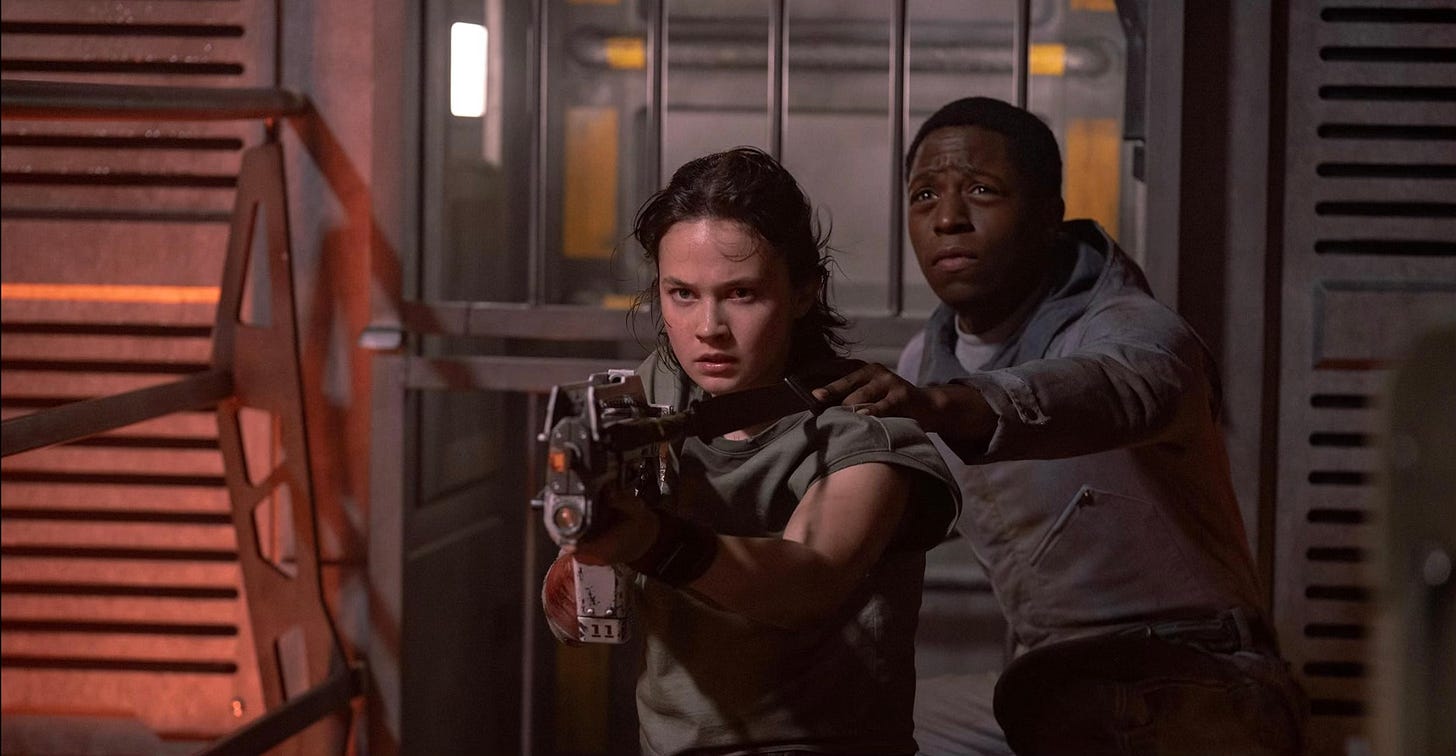
Alien: Romulus, Fede Álvarez [20th Century]
Orbital, Samantha Harvey [Grove]
Like any sensible person, I pre-gamed Alien: Romulus (2024) with a viewing of Alien (1979). Many factors make the 1979 installment satisfying, but perhaps because it was a Friday, I kept coming back to its depiction of space as just another corporate gig.
Two of the crew start an argument about getting paid out at a higher bonus rate. “It’s not in my contract to do this kind of duty.” Ripley reminds Ash that she outranks him after he allows the search party back on the ship. Part of what makes the 1979 Xenomorph horrifying is that it invades the banal, familiar small-team workplace.
Alien: Romulus comes chronologically in between Alien and Aliens (1986). The Weyland-Yutani corporation is still the overlord, but this crew is brought together not by commercial assignment, but a quest to get off-planet. It’s very Rogue One meets The Breakfast Club. Big dreams, fractured friendships, uneasy alliances. Can this gang make it?
Perhaps that’s why David Jonsson as the synthetic human Andy delivers the most interesting performance. Andy is the one character who remains trapped in a job. He is brought along because as a creation of the Weyland-Yutani corporation, he can interface with MU/TH/UR aka Mother in order to get the parts needed for their escape.
I'm still sorting out my feelings about Andy, particularly his upgrade and subsequent downgrade at the hands of his sister, Rain (Cailee Spaeny).
Are you really a good sister if you let your friends bully your brother? If you hold the power to tune your sibling’s abilities up and down? Am I just romanticizing the idea of being a sister?
I’m also so excited for men to someday use therapy rather than horror films to explore their emotions about reproductive anatomy and process. I didn’t think we could top the c-section of Prometheus, boy-howdy does Álvarez give it a shot.
So yes, sibling betrayal, body horror, multiple space craft, this film has everything. Except Álvarez let the corporate overlords become too distant, too indistinct. Bring back the workplace grind of late 1970s/early 80s films. It’s time for private corporations to be the chief baddie again.
—
As I read Samantha Harvey’s Orbital, I started thinking of space in terms of E.M. Forster’s round and flat characters. In Orbital, space is a full, ambient character.
In her fifth novel, Harvey set out to create a realist novel set in the extra terrestrial. “What I wanted to do was to write something that might count, I suppose, as nature writing about space,” she told the Burned by Books podcast.
Orbital takes place on the International Space Station, although Harvey doesn’t name the station directly. She has been viewing and reading the visual documentation around the ISS for years:
Doing multiple orbits of Earth for months online made me want to try to do justice in words to the beauty of the Earth and how I feel about the unnerving fact of its aloneness – could I do justice to that in the way an image can?
There is a multi-part tour of the ISS on YouTube narrated by astronaut Sunita Williams. In 2012, when Williams filmed it, she was on a four month mission to the ISS.
She is currently back in residence—one of the two astronauts stuck in orbit due to problems with the Boeing Starliner. Nasa announced Saturday that the two will remain in space until February when a planned SpaceX mission will bring them back to earth.
WSJ has good long read on both astronauts as well as the Boeing-SpaceX of it all (it published before the plans for their return had been settled):
At the end of the call, a student asked a seemingly innocuous question: “How many days will you be in space?” For Williams, who was four days into what was meant to be an eight-day mission, the answer should have been clear. It wasn’t: “We’re not exactly sure when we’re going to come back.”
Williams’ videos are a good companion to the novel. Both Williams and Harvey manage to make the cramped, vertiginous cluster of the station seem glorious rather than claustrophobic.
“I play this game with myself about where we are flying over earth. I try to come in here and just guess,” Williams tells us from the Cupola while the camera pulls in and out of focus.
There is a delicious 10 second pause at the 1:03 mark while she orients herself before telling us we are over Africa.
The International Space Station is at the end of its life. It is due to be retired in just six years, but the international relations that underpin it are already under strain. Harvey uses the transit of the station to talk about the absurdity of geopolitical conflict.
“You will see, they were told, its fullness, its absence of boarders except those between land and sea. You’ll see no countries, just a rolling, indivisible globe which knows no possibility of separation, let alone war.”





